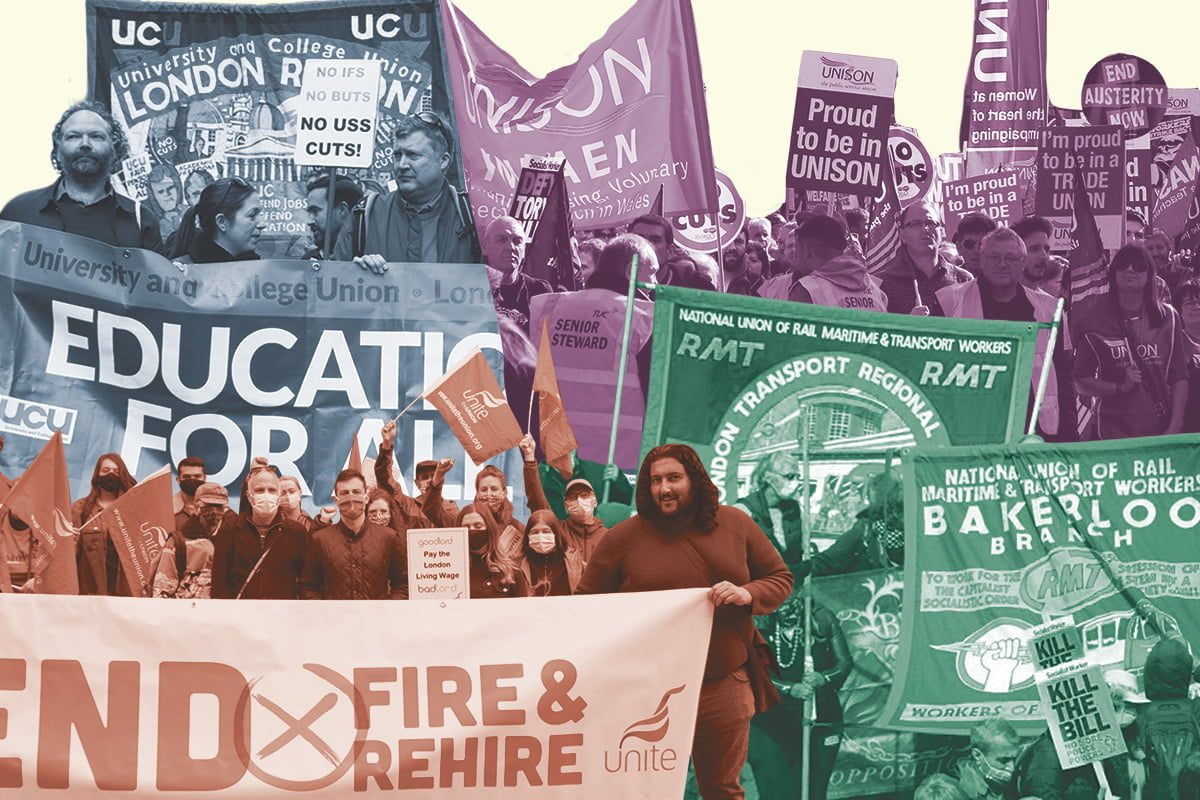Stand up to Tata: It’s now or never!
Alex Falconer, South Wales Communists
Tata bosses are clearly rattled. At the first sign of a fightback in Port Talbot, with news that the steelworkers are to be balloted for potential strike action, they’ve threatened their employees: if they dare to strike, they will have their redundancy payments revoked.
Just the hint of industrial action is enough to worry the bosses. They know a strike could escalate, potentially into an occupation of the steelworks, and hit them in the profits.
Where next?
What is being offered by Tata is nothing more than a choice between death by hanging or drowning.
Tata’s owners couldn’t care less about their workers or the town of Port Talbot. Their gangsterism and thirst for even greater profits is going to destroy both.
The bosses’ cards are on the table. They’ve thrown down the gauntlet to the unions and the workers. The only question now is whether to fight back or surrender?
Foot dragging
Tata bosses are fearful. But it’s not the union leaders that scare them. They have done little-to-nothing to suggest that a militant fightback is forthcoming.
Even now, Alun Davies, national officer for steel at Community, has said: “At this time, Community is not confirming an industrial action ballot timetable, and this would be premature as we have not yet exhausted the procedures.” (our emphasis)
We’re long past premature! Redundancy notices have already gone out. The first job losses are looming. The only thing that’s been exhausted is precious time – time that should have been spent organising and mobilising.
For months now, the steel union leaders have attempted to bargain with the bosses, while keeping workers in the dark. Their marches have been more akin to a funeral procession than a militant fightback.
What the unions and the Welsh Trades Union Congress (WTUC) should be doing is launching a campaign across the labour movement, and across the whole of Wales, to fight these job losses, calling for solidarity from workers everywhere.
Time running out
A comparison with the movement of the Welsh farmers is striking. They have organised slowdowns on the motorways, formed barricades around Welsh ministers’ offices, and rallied thousands of infuriated farmers outside of the Senedd. This is the fighting approach that workers need to take!
The situation in Port Talbot is on a knife edge. The town could still be saved. But action needs to be taken now.
If the unions won’t provide a lead, then the steelworkers should rely on their own strength. This means standing up to the bosses, organising an immediate walkout, and taking united strike action.
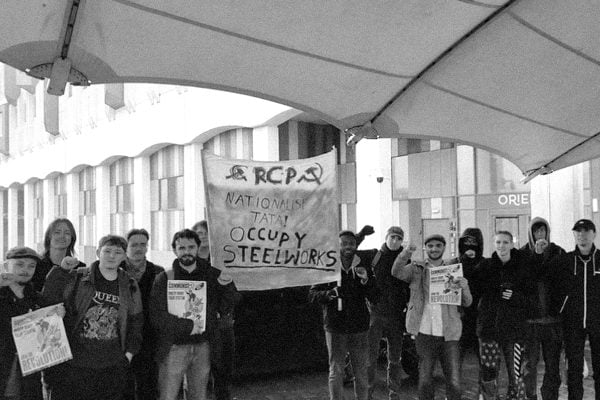
An appeal should be made to the working-class community to form steelworkers’ support committees, along the lines of those that were formed to aid the miners.
This could pave the way to a full-on occupation of the plant. This would force Tata to eat their words, and save the jobs they’re threatening to axe.
It’s time to show these fat-cats who’s really in charge. It’s now or never!
PCS ballot: Re-mobilise the troops! Coordinate the fightback!
PCS Communists
The Public and Commercial Services (PCS) union has announced plans to ballot 150,000 members for strike action, including high-impact areas like the Passport Office and HMRC.
This strike has been called in the context of civil servants receiving some of the worst pay in the public sector, alongside chronic issues like turnover and underfunding.
The union’s demands include pay restoration, a £15 per hour living wage, and a shortening of the working week with no loss of pay. These are good demands, and could serve as an example to other public sector unions.
The mood in the union is mixed at present. Some workers are frustrated by the handling of the online consultation, and by the scheduling of the ballot process. DVLA workers we spoke to also told us about disillusionment in their workplace, linked both to these factors and to events surrounding the previous round of strike action.
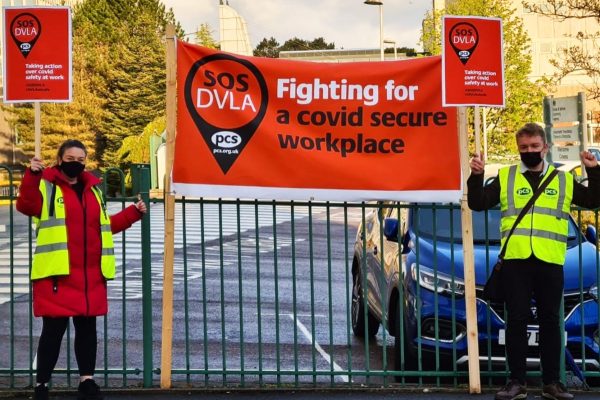
The desire to launch a serious fightback is also there, however. In Ofqual, for example, our comrade took part in a discussion where the demands of the pay campaign brought the branch to life, with members keen to take up roles in fighting for a Yes vote.
This shows the potential that exists – potential that must now be seized, in order to turn the tables on the government this year.
The key thing is to ensure that members are fully engaged at all levels, over the duration of both the ballot and the dispute, and are able to link their struggles to those of other unions.
One of our comrades, for example, has proposed a conference motion for cross-union strike committees, in order to link our strikes with those of other unions. This has been passed unanimously by their branch.
Bold initiatives like this can be a stepping stone to revitalising the union, and to coordinating with other unions for a new, bigger strike wave. This is what communist civil service workers are fighting for!
Grady wins UCU elections, as left vote splits
UCU Communists
The UCU elections recently came to a close, with incumbent Jo Grady reelected on a turnout of just 15%.
This low turnout is reflective of the low morale in the union, following two long national disputes. One of these, over pay and conditions, remains ‘open’.
This battle has dragged on thanks to poor leadership and anti-democratic shenanigans by Grady and the wider leadership. Their actions scuppered the struggle and demoralised rank-and-file members – evident in the failure to get over the 50% turnout threshold in the last strike ballot.
Despite all of this, Grady was reelected. This is primarily due to a split in the left vote. The results show that if there had been a single left candidate against Grady, it’s likely they would have won.
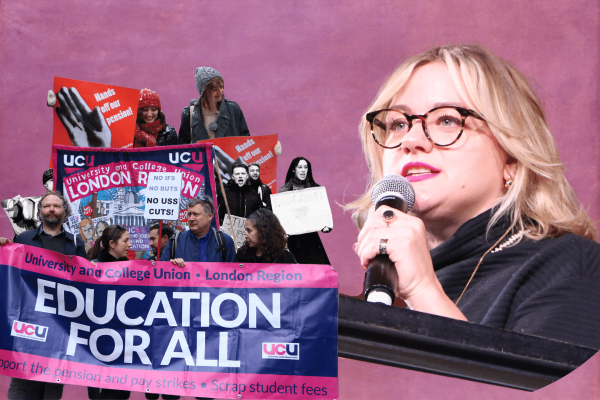
Unfortunately, the left vote was split between Vicky Blake, a well-known activist and a soft-left candidate, and Saira Weiner, the candidate of the UCU Left, who was standing on a militant and democratic programme.
This has happened before in the UCU, and in many other union elections. The result is always the same: allowing ‘moderate’, class-collaborationist candidates to slip through and win.
The lesson for next time is for the left to stand a single candidate on a fighting and democratic programme, with a campaign based on the grassroots.
Attacks on higher education workers are coming in thick and fast. Just recently, 120 Sheffield Hallam staff found out they are at risk of redundancy.
With the UCU election now over, rank-and-file union activists must prepare for battle and demand their leadership begin a national, united struggle against these cuts.
Bankrupt Birmingham: What are the unions doing?
Roman Merker, Birmingham Communists
On 5 March, Birmingham City Council signed off on a new wave of austerity and a 21% rise in council tax. This comes on the back of a scandalous equal-pay claim that the council failed to deal with, alongside a bodged IT system upgrade – both of which cost hundreds of millions of pounds.
Working-class residents have not been involved in any decision-making. Yet we’re the only reason the city runs at all. So why should we bear the consequences of the authorities’ failures?
In response to the crisis, the unions have organised two protests. Unfortunately, the attendance and mood at both were somewhat flat.
The blame for this lies with the passivity of the union leaders. In general, their message is that we need to wait for a Labour government to get in power.
But does anybody think that a Starmer government would behave any differently to the Tories when it comes to austerity and cuts?

In the meantime, the unions have provided no plan for industrial action to resist these cuts. Unison, the biggest union in Birmingham, has said nothing.
We cannot wait for any saviours. Instead, if any worker loses even a penny of their salary, or if even one job is axed, the unions should respond defiantly. This means balloting to strike as soon as possible, and planning serious action.
Rank-and-file committees should be organised to coordinate a one-day general strike for all public workers across Birmingham. This would really show the commissioners who’s in charge.
The attacks facing Birmingham are the tip of the iceberg. A fightback here could show the way forward for working-class communities everywhere. It’s time to draw a line in the sand and take a stand.
Amazon unionisation: The struggle continues
Jazir Mohammed and Rikitesh Kumar, Warwick Communists
The fight to unionise at Amazon UK continues. Warehouse workers attempting to organise have had to face down many strike-busting efforts by the company. But they’ve fought through every barrier placed in their way.
One worker, “S”, speaking to The Communist, told us that: “Idle time is used to pay even less wages, despite a full day’s work. If a worker has an idle time of 30 minutes, it is then rounded up to a full hour for which the wages aren’t paid.”
The bosses regularly deploy classic divide-and-rule tactics. S noted that: “Managers often [fuel] and heighten racial tensions amongst the company’s multicultural workforce when it comes to making decisions for promotion.”
Another worker, named “G”, discussed the sheer level of contempt held by management towards workers. He said there was a culture of managers constantly taking excessive and unnecessary disciplinary measures against workers, “in order to prove themselves to higher ups and get promotions”.
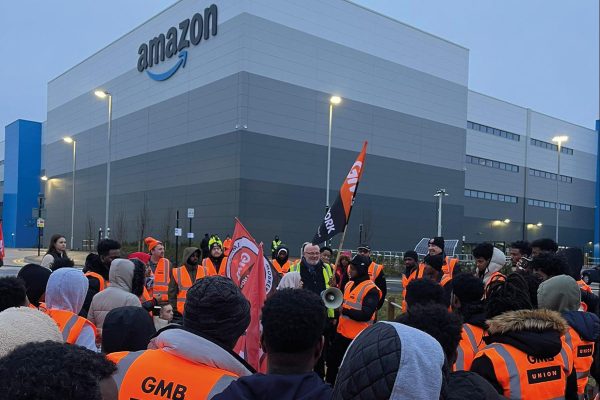
Despite the setbacks, . Two further strike days are planned for 19 and 20 March.
Successfully unionising workers at the world’s biggest company would be a major victory for the entire labour movement, giving confidence to workers everywhere.
Cambridge delivery riders mobilise
Hasan Wright, Cambridge Communists
Cambridge delivery strikes are heating up. We have been speaking to riders for several weeks now, and it is becoming increasingly clear: food delivery companies are running out of road.
Workers tell us that the recent Valentine’s Day pickets were militant, with riders encircling Clifton Road Morrisons on bikes and blocking entry to Deliveroo kitchens.
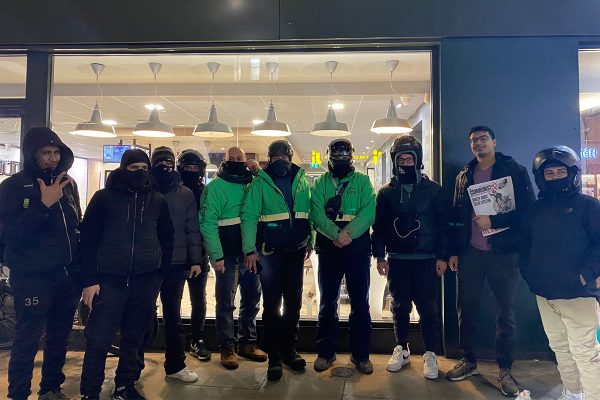
Possibly some 200 hundred riders participated – maybe two-thirds of the total in Cambridge. The riders are all incensed by cuts to payments, which have plunged the majority far below the hourly minimum wage.
Virtually every rider we have spoken to wants further strikes. Many are even talking about indefinite action. The problem is that nobody is calling it.
Several riders thought that another strike would take place on 10 March. But this proved to be more of a rumour than a hard fact.
Unaware of what exactly was due to take place, we did our best to spread the word about this potential strike with posters and leaflets. And we got riders’ phone numbers, to help them organise and make this round of action even bigger than the last.
But in the end, widespread strike action failed to materialise. Only those riders who we helped to mobilise showed up to form picket lines.
This episode reveals the hunger for strikes amongst these workers. That a relatively small group of activists, such as us, can organise action – armed only with a few flyers and phone numbers, – shows the potential that exists.
Subsequently, we have changed our tactics, forming a new group chat with a QR code for riders across town to scan. At the time of writing, some 40 riders are organised in this chat. And we intend to use this as a platform for riders across Cambridge to call further action.
But this is the least we can do. By patiently discussing our ideas with them, we are close to recruiting several of the riders.
Given time and support, these red riders can help lead the fight not just against the Deliveroo bosses, but against the capitalist class as a whole. All they need now is a party to organise with – and the RCP aims to provide them with exactly that!

